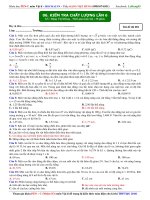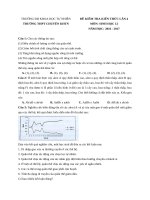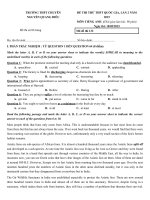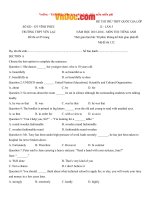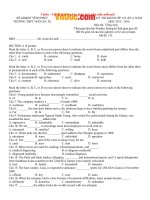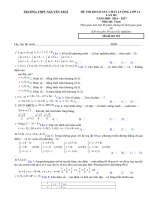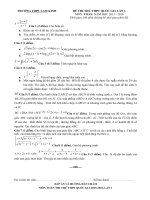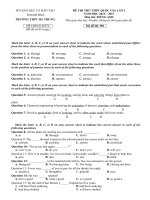Tải Đề thi thử THPT Quốc Gia lần 3 năm 2019 môn Tiếng Anh trường THPT Chuyên Vĩnh Phúc - Đề thi THPT Quốc Gia 2019 môn Anh có đáp án
Bạn đang xem bản rút gọn của tài liệu. Xem và tải ngay bản đầy đủ của tài liệu tại đây (100.9 KB, 8 trang )
<span class='text_page_counter'>(1)</span><div class='page_container' data-page=1>
<b>ĐỀ THI THỬ THPT QUỐC GIA MÔN TIẾNG ANH</b>
<b>NĂM 2019 </b>
<b>CÓ ĐÁP ÁN</b>
<b>Mark the letter A, B, C or D on your answer sheet to indicate the word that differs</b>
<b>from the rest in the pronunciation of the underlined part in each of the following</b>
<b>questions.</b>
<b>Question 1: A. punctual B. rubbish </b> C. frustrate D. furious
<b>Question 2: A. rough </b> B. laugh C. cough D. plough
<b>Mark the letter A, B, C or D on your answer sheet to indicate the word that differs</b>
<b>from the other three in the position of the primary stress in each of the following</b>
<b>questions.</b>
<b>Question 3: A. mailbox </b> B. manner C. mature D. summer
<b>Question 4: A. generous B. genuine </b> C. kangaroo D. fortunate
<b>Mark the letter A, B, C or D on your answer sheet to indicate the word(s) CLOSEST in</b>
<b>meaning to thee underlined part(s) in each of the following questions.</b>
<b>Question 5: I’ll not stand for your bad attitude any longer.</b>
A. care B. like C. tolerate D. mean
<b>Question 6: “You’ve eaten all the chocolate cake?” – “What of it?”</b>
A. What does it matter? B. What’s happened to it?
C. Where is the rest? D. You mean I’ve eaten all of it?
<b>Mark the letter A, B, C or D on your answer sheet to indicate the word(s) OPPOSITE</b>
<b>in meaning to the underlined part(s) in each of the following questions.</b>
<b>Question 7: On the spur of the moment, she decided to enter the race that she had come to</b>
watch.
A. Without previous thought B. For only a short time
C. After careful thought D. At the earliest possible moment
<b>Question 8: Most of the guests at the dinner party chose to dress elegantly, but one man</b>
wore jeans and a T–shirt; he was later identified as a high school teacher.
</div>
<span class='text_page_counter'>(2)</span><div class='page_container' data-page=2>
<b>Mark the letter A, B, C or D on your answer sheet to show the underlined part that</b>
<b>needs correction.</b>
<b>Question 9. Without speaking other word, I stared at the ridges of sand in the moonlight.</b>
A. stared at B. in C. without D. other
<b>Question 10: Not until the late Middle Ages glass became a major construction material.</b>
A. major B. the late C. Not D. glass became
<b>Question 11: The best defense against tsunamis are early warning that allows people to seek</b>
higher ground.
A. ground B. against C. are D. seek
<b>Mark the letter A, B, C or D on your answer sheet to indicate the correct answer to</b>
<b>each of the following questions.</b>
<b>Question 12: We were lucky to be able to finish the project ahead _______ schedule.</b>
A. by B. before C. of D. for
<b>Question 13: I don’t feel like buying a _______ in a poke; we’d better check the content.</b>
A. ox B. pig C. buffalo D. cattle
<b>Question 14: I don’t know what it _______ to be as popular with girls as my brother is.</b>
A. uses B. takes C. demands D. expects
<b>Question 15: I caught _______ of a lion lying under the tree, and my heart jumped.</b>
A. look B. sight C. scene D. view
<b>Question 16: I was most _______ of his efforts to help me during the crisis.</b>
A. appreciative B. appreciable C. appreciation D. appreciate
<b>Question 17: The phone _______ constantly since Jack won the first prize this morning.</b>
A. had been ringing B. has been ringing C. had rung D. rang
<b>Question 18: My neighbour is _______ photographer; Let’s ask him for _______ advice</b>
about color film.
A. a – the B. the – an C. a – Ø D. the – the
<b>Question 19: TV advertising in the late afternoon tends to _______ young children.</b>
A. aim B. point C. focus D. target
</div>
<span class='text_page_counter'>(3)</span><div class='page_container' data-page=3>
<b>Question 21: I asked Angela to run the office while I’m gone _______ I know I can depend</b>
on her.
A. since B. unless C. although D. therefore
<b>Question 22: Why don’t you just say you _______ calling him a fool and make things up?</b>
A. pity B. mercy C. sorry D. regret
<b>Question 23: Most folk songs are ballads _______ have simple words and tell simple</b>
stories.
A. what B. that C. although D. when
<b>Question 24: Most of the _______ in this workshop do not work very seriously or</b>
productively.
A. eager beavers B. old hand C. rank and file D. tooth and nail
<b>Question 25: Amber is a hard, yellowish brown _______ from the resin of pine–trees that</b>
lived millions of years ago.
A. substance formed B. forming a substance C. substance has formed D. to form a substance
<b>Mark the letter A, B, C or D on your answer sheet to indicate the sentence that is</b>
<b>closest in meaning to each of the following questions.</b>
<b>Question 26: Arguing with the boss has considerably reduced his chances of promotion.</b>
A. His promotion was certain until he had a dispute with the boss.
B. He would definitely have been promoted by now if had hadn’t quarreled with the boss.
C. He argued with the boss about why he wasn’t considered for promotion.
D. The likelihood of his being promoted has significantly decreased because of his argument
with the boss.
<b>Question 27: Astronomy greatly interests him.</b>
A. He finds astronomy very interested.
B. He is very interesting in astronomy.
C. He takes a keen interest in astronomy.
D. Astronomy is the subject he enjoys the most.
<b>Question 28: She reminded her daughter of the table manners.</b>
A. She wanted her daughter to remember all meal time.
</div>
<span class='text_page_counter'>(4)</span><div class='page_container' data-page=4>
C. She wanted her daughter to leave the dinner table.
D. She wanted her daughter to eat a little more slowly.
<b>Mark the letter A, B, C or D on your answer sheet to indicate the sentence that best</b>
<b>combines the pair of sentences given in each of the following questions.</b>
<b>Question 29: His academic record at high school was poor. He failed to apply to that</b>
prestigious university.
A. His academic record at high school was poor as a result of his failure to apply to that
prestigious university.
B. Failing to apply to that prestigious university, his academic record at high was poor.
C. His academic record at high school was poor because he didn’t apply to that prestigious
university.
D. His academic record at high school was poor; as a result, he failed to apply to that
prestigious university.
<b>Question 30: They are my two sister. They aren’t teachers like me.</b>
A. They are my two sisters, neither of whom are teachers like me.
B. They are my two sister, who neither are teachers like me.
C. Unlike me, neither of my two sisters are not teachers.
D. They are my two sisters, both of those are teachers like me.
<b>Mark the letter A, B, C or D on your answer sheet to indicate the most suitable</b>
<b>response to each of the following exchanges.</b>
<b>Question 31: Kathy and Kim are friends. They have just finished lunch in a restaurant.</b>
Kathy: “The food is great. I’ll get the bill.”
Jim: “_______”
A. Yes, speak to you soon. B. Don’t mention it.
C. It’s nothing. D. No, this is on me.
<b>Question 32: Laura: “Remember to phone me when you arrive at the airport.”</b>
Annie: “_______.”
A. I don’t B. I do C. I will D. I remember
</div>
<span class='text_page_counter'>(5)</span><div class='page_container' data-page=5>
THE LIFE OF COUNTRY VET
Don Strange, who works as a vet in northern England, leads a busy life. As well as having to
treat pets which are unwell, he often visits farms where problems of (33) _______ kinds
await him. He has lost (34) _______ of the number of times he has been called out at
midnight to give advice to a farmer with sick sheep or cows.
Recently, a television company chose Don as the subject of a documentary program it was
making about the life of a country vet. The program showed the difficult situations Don
faces every day such as helping a cow to give birth or winning the trust of an aggressive dog
(35) _______ needs an injection. Not all of Don’s patients are domestic animals, (36)
_______, and in the program people saw him helping an owl which had a damaged wing. It
also showed Don holding a meeting with villagers concerned about the damage a new road
might do to their (37) _______ environment.
<b>Question 33: A. various </b> B. variety C. variation D. varied
<b>Question 34: A. count </b> B. score C. memory D. patience
<b>Question 35: A. whose </b> B. which C. of which D. who
<b>Question 36: A. yet </b> B. however C. although D. therefore
<b>Question 37: A. nearby </b> B. area C. local D. close
<b>Read the following passage and mart the letter A, B, C or D on your answer sheet to</b>
<b>indicate the correct answer to each of the questions.</b>
The time when human crossed the Arctic land bridge from Siberia to Alaska seems remote
to us today, but actually represents a late stage in the prehistory of humans, an era when
<b>polished stone implements and bows and arrows were already being used and dogs had</b>
already been domesticated.
</div>
<span class='text_page_counter'>(6)</span><div class='page_container' data-page=6>
dominated the land. Here, as in the Old World, there is evidence that humans hunted these
elephants, as shown by numerous spear points found with mammoth remains.
Then, at the end of the Ice Age, when the last glaciers had retreated, there was a relatively
sudden and widespread extinction of elephants. In the New World, both mammoths and
mastodons disappeared.
<b>In the Old World, only Indian and African elephants survived. Why did the huge, seemingly</b>
successful mammoths disappear? Were humans connected with their extinction? Perhaps,
but at that time, although they were cunning hunters, humans were still widely settled and
not very numerous. It is difficult to see how they could have prevailed over the mammoth to
such an extent.
<b>Question 38: With which of the following is the passage primarily concerned?</b>
A. Techniques used to hunt mammoths
B. The relationship between man and mammoth in the New World
C. The prehistory of humans
D. Migration from Siberia to Alaska
<b>Question 39: Where were the imperial mammoths the dominant type of mammoth?</b>
A. in South America B. in the central portion of North America
C. in the southern part of North America D. in Alaska
<b>Question 40: The phrase “these early migrants” in paragraph 2 refers to ____.</b>
A. mastodons B. humans C. mammoths D. dogs
<b>Question 41: It can be inferred that when humans crossed into the New World, they ____.</b>
A. had never seen mammoth before
B. soon learned to use dogs to hunt mammoths
C. brought mammoths with them from the Old World
D. had previously hunted mammoths in Siberia
<b>Question 42: Which of the following is NOT true about prehistoric humans at the time of</b>
mammoths extinction?
A. They were concentrated in a small area. B. They were skilled hunters.
</div>
<span class='text_page_counter'>(7)</span><div class='page_container' data-page=7>
A. apparently B. obviously C. tremendously D. formerly
<b>Question 44: Which of the following could be best substitute for the word “implements”?</b>
A. tools B. ornaments C. carvings D. houses
<b>Question 45: Which of the following types of elephants does the author discuss in the most</b>
detail in the passage?
A. The mammoth B. The African elephant C. The mastodon D. The Indian elephant
<b>Read the following passage and mart the letter A, B, C or D on your answer sheet to</b>
<b>indicate the correct answer to each of the questions.</b>
What is meant by the term economic resources? In general, these are all the natural, man–
made, and human resources that go into the production of goods and services. This
obviously covers a lot of ground: factories and farms, tools and machines, transportation and
communication facilities, all types of natural resources, and labor. Economic resources can
be broken down into two general categories: proper resources– land and capital– and human
resources– labor and entrepreneurial skills.
What do economists mean by land? Much more than the non–economist. Land refers to all
<b>natural resources that are usable in the production process: arable land, forests, mineral and</b>
oil deposits, and so on. What about capital? Capital goods are all the man–made aids to
producing, storing, transporting, and distributing goods and services. Capital goods differ
<b>from consumer goods in that the latter satisfy wants directly, while the former do so</b>
indirectly by facilitating the production of consumer goods. It should be noted that capital as
defined here does not refer to money. Money, as such, produces nothing.
<i>The term labor refers to the physical and mental talents of humans used to produce goods or</i>
services (with the exception of a certain set of human talents, entrepreneurial skills, which
will be considered separately because of their special significance). Thus the services of a
factory worker or an office worker, a ballet dancer or an astronaut all fall under the general
heading of labor.
<b>Question 46: What is the author's main purpose in writing this passage?</b>
A. To explain the concept of labor.
B. To criticize certain uses of capital.
</div>
<span class='text_page_counter'>(8)</span><div class='page_container' data-page=8>
D. To define economic resources.
<b>Question 47: The phrase “the latter” refers to _______.</b>
A. non–economists B. consumer goods C. capital goods D. economist
<b>Question 48: When non–economists use the term "land", its definition _______.</b>
A. is much more restrictive than when economists use it
B. is much more general than when economists use it
C. includes all types of natural resources
D. changes from place to place
<b>Question 49: Which of the following could be considered a capital good as defined in the</b>
passage?
A. A railroad B. A coal deposit C. Human skills D. Money
<b>Question 50: The word “arable” is closer in meaning to _______.</b>
A. dry B. open C. developed D. fertile
<b>ĐÁP ÁN</b>
Question 1 D Question 2 D Question 3 C Question 4 C Question 5 C
Question 6 A Question 7 C Question 8 C Question 9 D Question 10 D
Question 11 C Question 12 C Question 13 B Question 14 B Question 15 B
Question 16 A Question 17 B Question 18 C Question 19 D Question 20 D
Question 21 A Question 22 D Question 23 B Question 24 C Question 25 A
Question 26 D Question 27 C Question 28 B Question 29 D Question 30 A
Question 31 D Question 32 C Question 33 A Question 34 A Question 35 B
Question 36 B Question 37 C Question 38 B Question 39 A Question 40 B
Question 41 D Question 42 A Question 43 A Question 44 A Question 45 A
Question 46 D Question 47 B Question 48 A Question 49 A Question 50 D
</div>
<!--links-->
